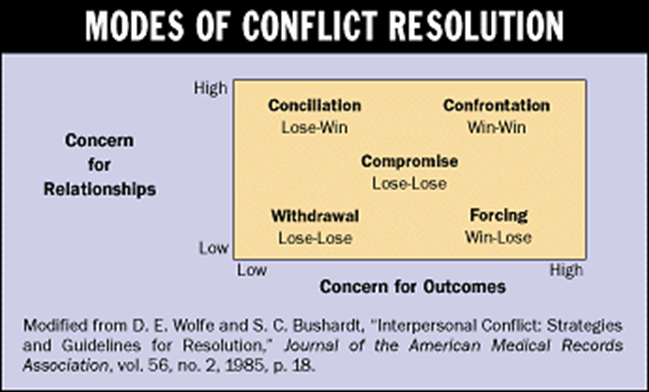To resolve a conflict between staff members regarding potential changes in policy, a nurse manager decides to implement the changes she prefers regardless of the feelings of those who oppose those changes. Which of the following conflict resolution strategies is the nurse manager using?
Cooperating
Collaborating
Competing
Compromising
The Correct Answer is C
A. Cooperating involves finding a middle ground and working together, which isn't reflected in the manager's unilateral decision-making.
B. Collaborating involves working together toward a solution that accommodates various perspectives, which isn't the case here.
C. Competing involves asserting one's own concerns at the expense of others' viewpoints, which aligns with the manager's decision to implement changes regardless of opposition.
D. Compromising entails finding a middle ground that satisfies all parties involved, which isn't evident in the manager's decision-making process.

Nursing Test Bank
Naxlex Comprehensive Predictor Exams
Related Questions
Correct Answer is D
Explanation
A. Referring the adult child to the primary care provider might not immediately address the information needed.
B. Directing the adult child to speak solely with the mother might not be the most helpful approach to gather necessary information.
C. Inviting the adult child to specify what information they seek is not correct as they would have to get this information from their mother or their mother wil have to consent.
D. It is the role of the nurse to inform the child that they cannot disclose that information since patient confidentiality is a priority.
Correct Answer is B
Explanation
A. Restraints should be applied based on a specific, documented need, not on an as- needed (PRN) basis, to ensure client safety.
B. A nurse can disclose information to a family member with the client's permission. This statement respects the client's right to privacy and confidentiality.
C. It is the responsibility of the doctor and not nurses to inform clients about available treatment options.
D. Administering medications without consent for research purposes is ethically unacceptable and violates the client's rights to autonomy and informed consent.
Whether you are a student looking to ace your exams or a practicing nurse seeking to enhance your expertise , our nursing education contents will empower you with the confidence and competence to make a difference in the lives of patients and become a respected leader in the healthcare field.
Visit Naxlex, invest in your future and unlock endless possibilities with our unparalleled nursing education contents today
Report Wrong Answer on the Current Question
Do you disagree with the answer? If yes, what is your expected answer? Explain.
Kindly be descriptive with the issue you are facing.
